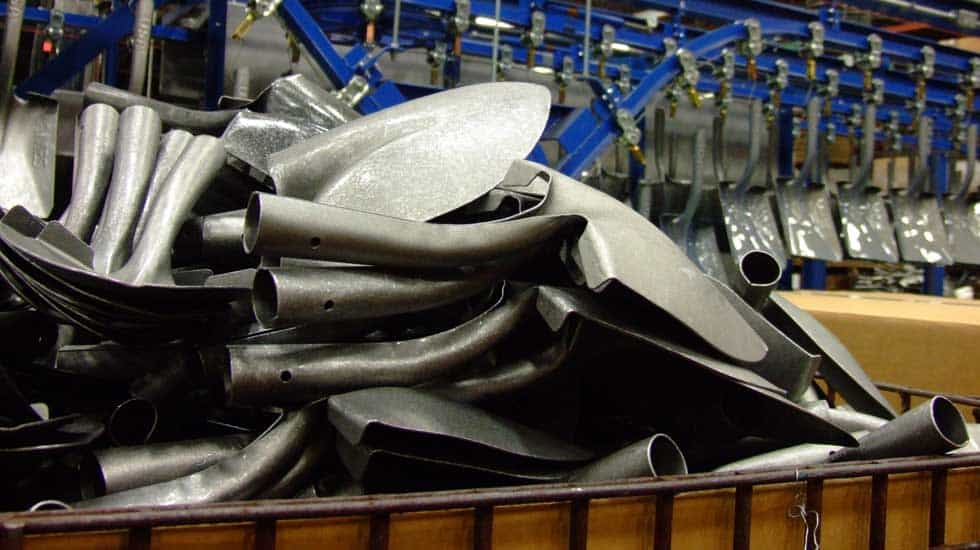I woke up early, as I often do at media events. After splashing water on my face and brewing a Keurig cup, I was set to tour Stihl’s Virginia Beach factory and demo Stihl battery-operated outdoor power equipment, together to cover Stihl’s 2024 Ride & Drive Event.

Stihl, you know – that chainsaw company, had invited, by my count, 18 journalists, YouTubers, bloggers, and influencers to their 150-acre campus not too far from the major port of Norfolk. We’d see their latest offerings in battery-powered chainsaws and tools in every other category of outdoor power equipment you could imagine. In Virginia Beach, more than half of the world’s Stihl equipment is made – some exported internationally. Battery-operated and gas-powered, too.
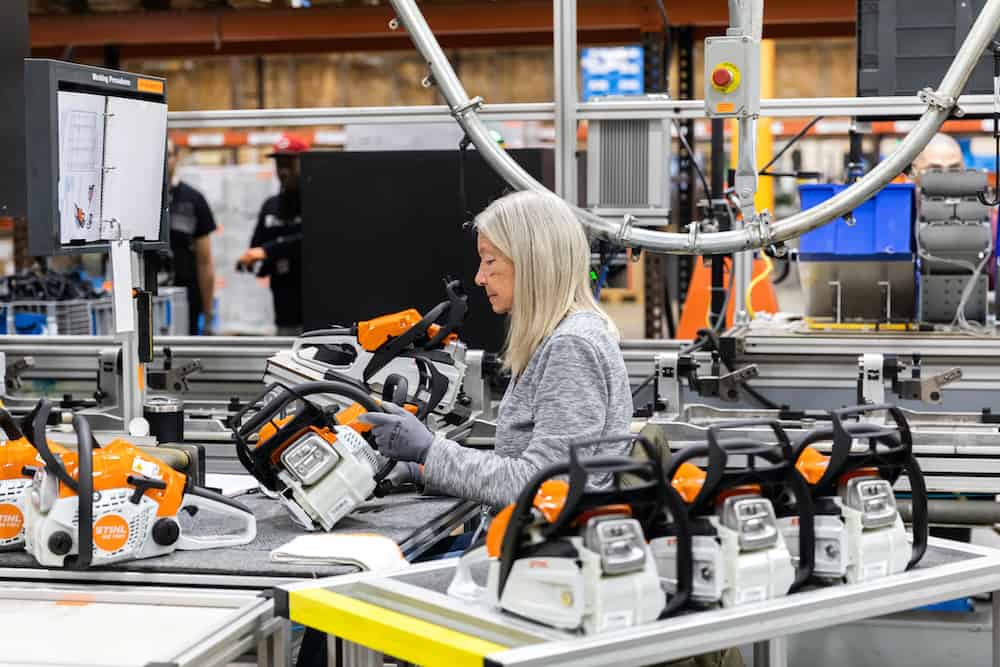
I came away with several key takeaways from my two-day stay in Virginia. I can’t wait to tell you about them. But first, I’m sorry – a little detour.
Backstory: What Happens When a Tree Falls in a Neighborhood?
I have a very flat yard with patches of tall, old-growth trees. I bring this up for one reason. Rain falls and goes, well, literally nowhere. Unless it rains more than an inch, all that water slowly and almost systematically makes its way into my neighbor’s yard, just below me.
My neighbor and I, doing the neighborly thing, have tried to manage this rainwater from both sides of the fence. We try, but despite all efforts, there is still a consistent, little underlying tension there.
Then, a few weeks ago, it rained a lot. Just enough to soften the ground, just on my neighbor’s side of the fence. Sure, other factors come into play, but this heavy rain helped soften the ground around an abnormally shallow-rooted pine. That tree, its roots, started to lift slightly from the ground. It was slight, but just enough that that 30-foot pine started to lean. A very noticeable five or so degrees. Heavy winds then pushed this tree a little further, in the exact direction of my neighbor’s house.
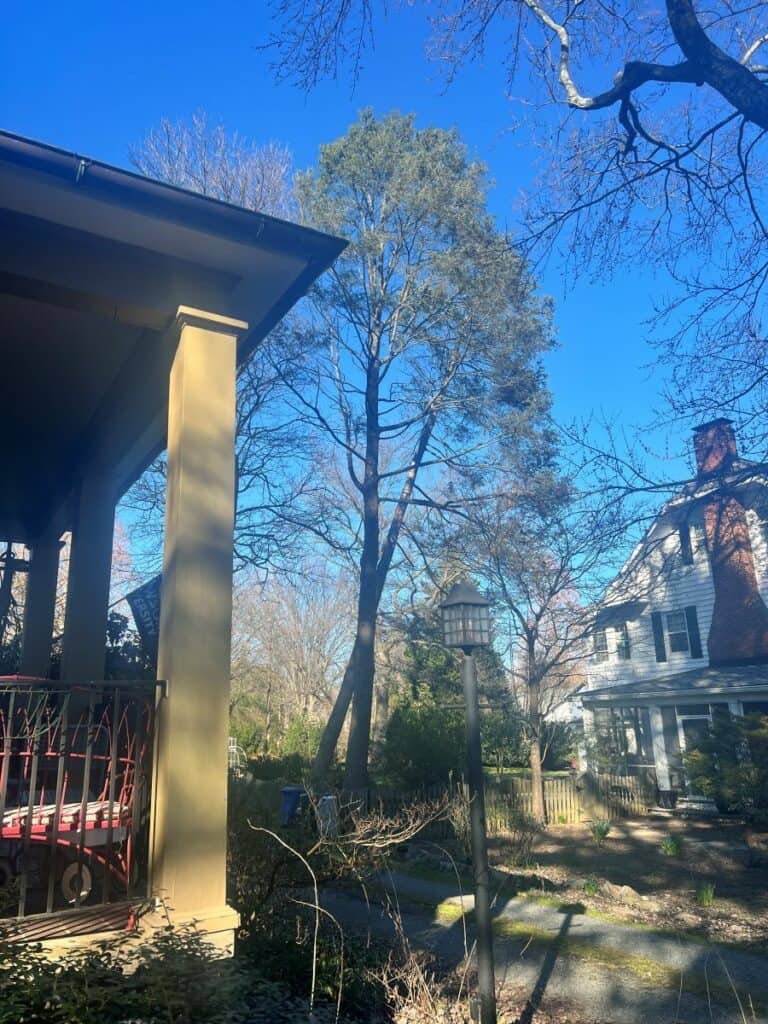
A local tree team arrived early the following day. Using my driveway for access, they brought in a giant crane to handle that troubled tree, and one other.
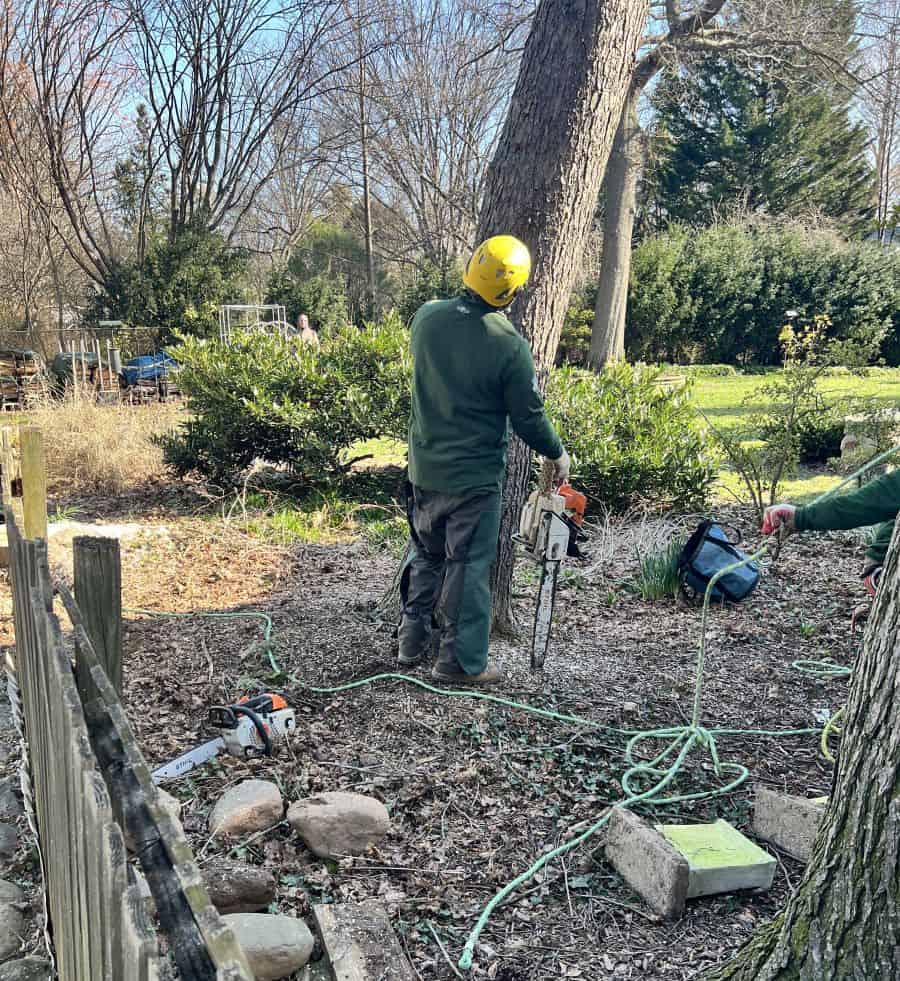
One crane, operator, climber, two guys on the ground working cut-up, cleanup, and feeding the shredder, four chainsaws of various sizes, and a backpack blower—all gas and all Stihl! Two 30-foot trees downed and cut to stumps by 11 a.m. One home and one neighborly relationship remained intact.
A Short History of Stihl
Andres Stihl is credited with developing the first gas-powered chainsaw in 1929. Across nearly a century of further firsts, the Stihl company also invented the first chain brake, provided advancements in anti-vibration systems, and introduced the chainsaw’s first fuel injection system. Now, nearly 100 years later, Stihl is the #1 selling chainsaw in the world AND the #1 selling brand of gasoline-powered handheld Outdoor Power Equipment in the US.
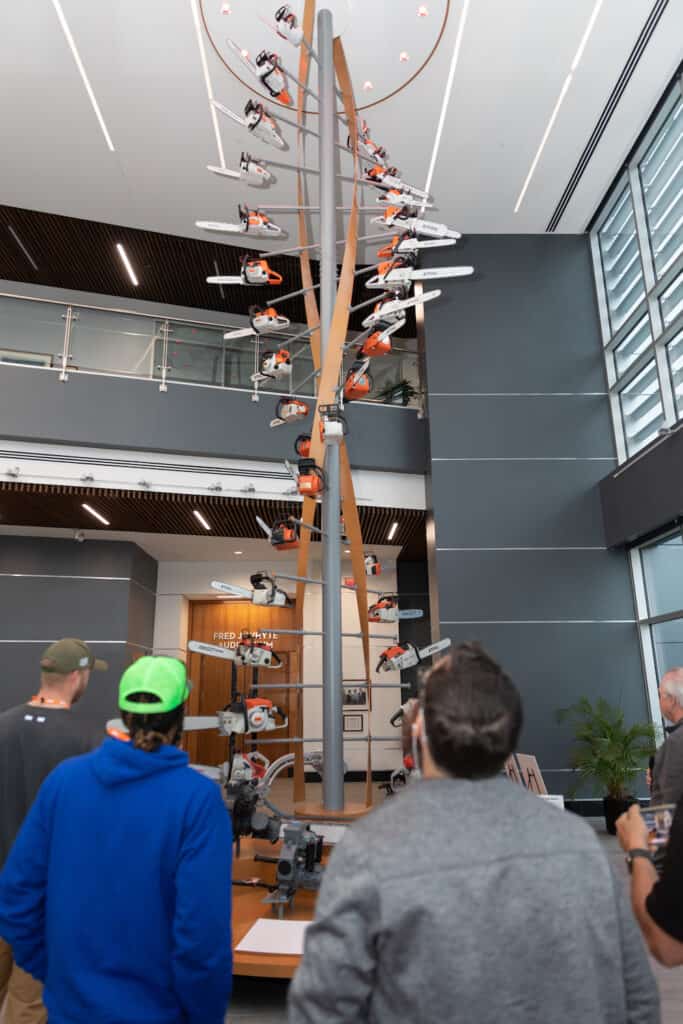
Still owned by the Stihl family, the company will celebrate its 50th anniversary in America later this year.
I own an MS 210; it’s been the perfect chainsaw for my general yard needs. It’s hard to imagine getting by without it. It’s hard to imagine that tree crew, too, doing what they need to do without chainsaws. Forestry services and firefighters can only do what they need to do with them. Where there is cleanup, there is usually Stihl, and there is a good chance it may still be running on gas.
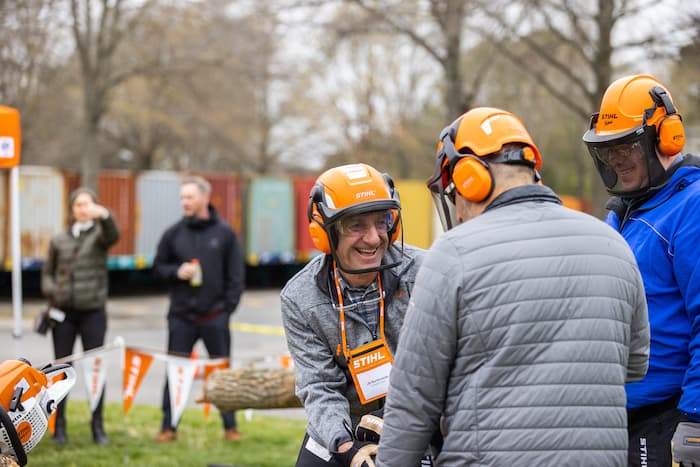
With that said, during our visit to Virginia Beach, we talked very little about gasoline. Instead, the day’s topic centered around Stihl battery-operated outdoor power equipment.
Battery Tech, the EV Dilemma & the Status of Gas
I chatted briefly over lunch with Stuart Morrison, the VP of Assembly. He talks, for lack of a better way to put it, of Stihl’s headspace. The battery tech is just now there, with more advancements, like tab-less and gel technologies, coming quickly. The tech is powering tools of enough quality to warrant the name Stihl.
They have clear plans for the battery-powered space, evidenced by large sections of the factory under construction, in the process of being repurposed for battery production. He recognizes that the primary consumer and the needed infrastructure and costs may not be wholly there yet.
Morrison equates this to what’s happening now with EVs. They offer reduced emissions, less reliance on fossil fuels, and lower total operating costs, but for many, it remains a question of Cost of Purchase vs. Cost of Ownership. Battery-powered tools and batteries still carry a relatively hefty price tag.
Battery power may be the future, but gas may still be the now.
He talks of recent spikes in the sales of certain lines of gas-powered equipment. He recognizes that some of his main competitors are all-electric, are going, or even have gone wholly battery-operated. Time to market is of utmost importance, but as you can guess, he recognizes that many of the company’s most valued consumers rely on the durability and dependability of Stihl’s gas-powered products.
This discussion generally underscored the two overarching takeaways from my visit. Stihl is a company that cares about two things—quality and loyalty. And as loyal as he knows his dealers and their customers are, you can say the same thing about Stihl: They are loyal right back.
While they are making inroads with their battery-powered tools, and costs will eventually become more reasonable, gas won’t be going anywhere, anytime soon.
Stihl Remains Unique in its Sales Model – Stihl’s Authorized Dealers
Stihl sells exclusively through Authorized Stihl Dealers, some 10,000 of them worldwide. Ace Hardware, yes, but big box stores, including Amazon, No.
Wes Bartosik, a contributor at Tool Box Buzz, loves this sales model. In most cases, it means you have to go see someone. “There is often a face-to-face exchange when you want to purchase a piece of Stihl equipment.”
You get questions answered, an in-person demo, and, in many cases, you may even be speaking with the same person who would ultimately service the machine if a problem arises.
Stihl owns six marketing and distribution centers and distributes exclusively to five independent centers around the country. Stihl’s network of dealers includes small to large tree/lawn care shops.
We saw an example of a showroom in the Virginia Beach facility.
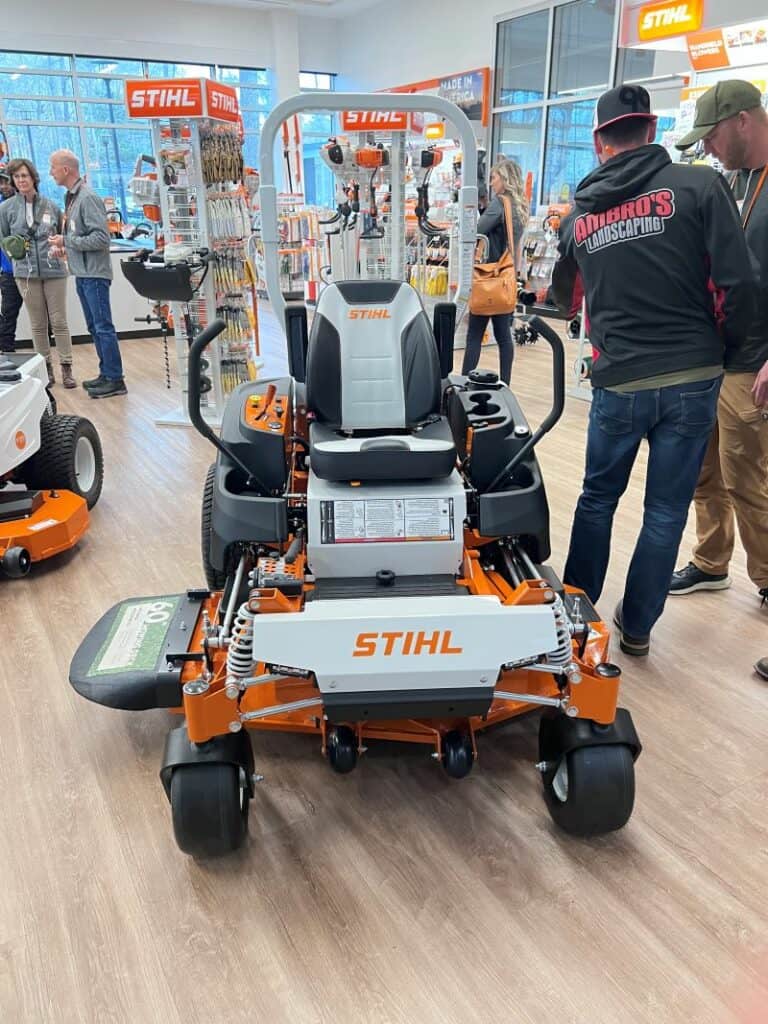
It represents an Elite Stihl Dealer, where, for handheld tools – there is exclusivity to the brand. There is also a secondary level of dealer certification. These dealers must meet additional stocking and training requirements administered by a Stihl Retail Readiness (SRR) Program. Beyond that, you can find different types of dealers based on what they sell (i.e., full-line dealers, battery exclusive dealers, zero-turn dealers, rental/industrial dealers).
Now, that said, and despite what you might guess, you may also find Stihl at a select few online locations—Ace Hardware, Northern Tool, and Acme Tool, to name a few. But for the most knowledgeable and well-trained on all of Stihl’s product lines, I’d say find a Stihl Elite Dealer in your area.
The Stihl Factory Tour
Stihl maintains over 1,000,000 square feet of space under its roof. Over 100 different models are made in this location. Some parts and even products are exported from the nearby Port of Norfolk to more than 80 countries around the world. In fact, it’s said you can purchase an American-made Stihl chainsaw in China.
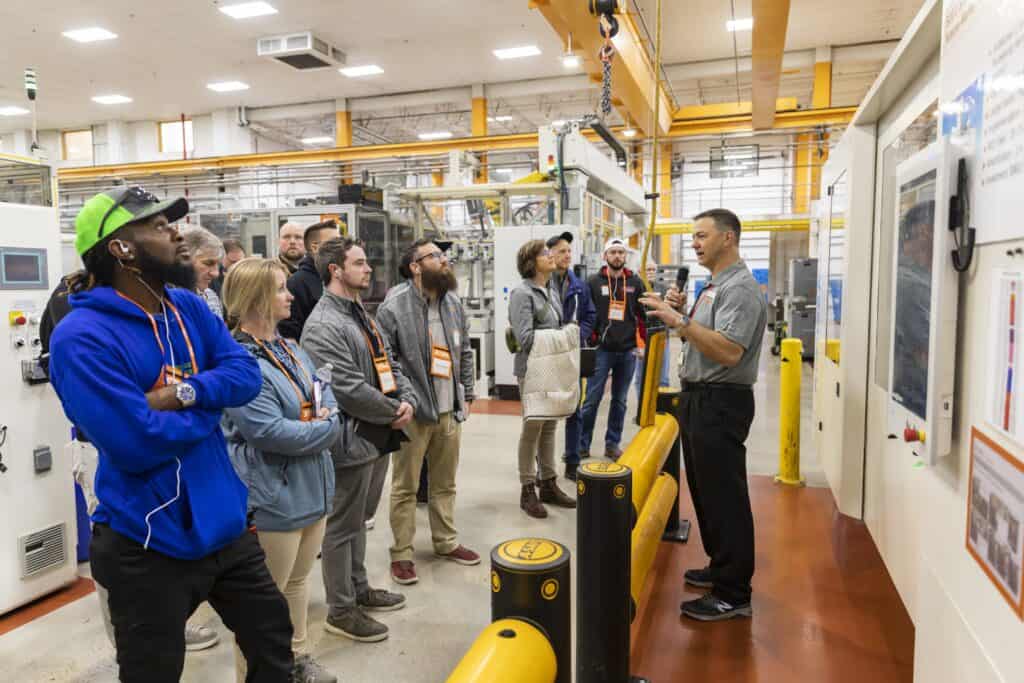
As a manufacturing effort, it is a finely tuned machine—really quite impressive. While some materials are sourced, and they do, in some cases, work with outside vendors, I was amazed by the percentage of parts that are actually produced on-site.
We saw factory facilities for machining pistons and crankshafts, Injection Molding, Battery Production, and Assembly. In the case of Trimmer Line Production, aka Extrusion Molding, yes, they make their own trimmer string. This unit even produces its own packaging. Waste plastics are reground and re-introduced to processes.
Controlling Quality
Much of it, as you can imagine, is highly automated, using robots for picking and packing and LGVs. Laser-guided material handlers zip around continuously – station to station. Screens overhead show Lean adages like “Balance in Tasks”, “Just In Time”, and “Cross Training”. I geek out on the Lean manufacturing thing and was pleased to hear that each department has a dedicated production department, a QA department, and a maintenance team.
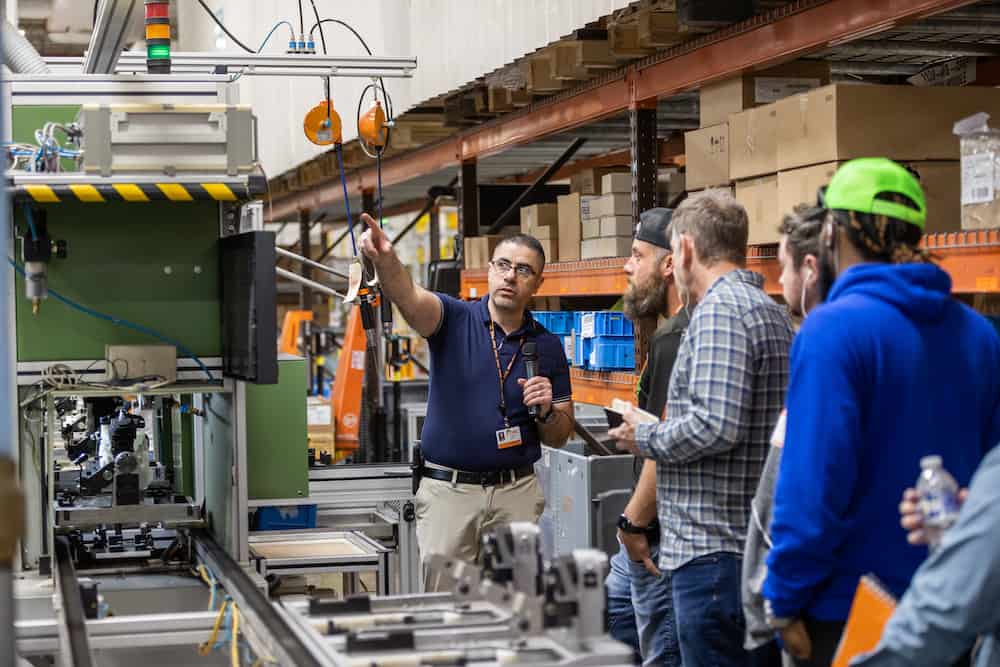
Throughout the factory, we heard similar statements from various department heads. Paraphrasing, “We want to control as many of our processes as possible – so we can control Quality.”
They claim a 1 ½ % defect rate. Donny Tabor, head of the Injection Molding unit, says, “We know defects happen. The defects are fine, but the goal is to catch them before they leave the area in which they are introduced.” This mentality keeps the factory up and running 24/7.
There is no way that I can do this part of our visit justice. We saw many of Stihl’s 2800 employees in action. The commitment to quality is pervasive – as evidenced by camera-based poka yoke systems on Assembly lines, random sampling quality inspections, and a “test box” setup at the end of each line – ensuring that every engine, gas-operated or battery-powered, functions correctly before it leaves the facility. (Each engine is started at least one more time during dealer setup.)
Stihl Wheeled Goods – You Know, Stihl Makes Lawn Mowers & Zero-Turns
While Virginia Beach produces more than half the world’s Stihl products, it’s clear that Europe still has a large influence.
It is seen in the factory. Most, if not all, product design comes from Stihl headquarters in Germany. The Quality Standards used in production, too, though often enhanced, originate there. But this European influence is seen when first looking at Stihl’s new push mowers and their latest iMOW robotic mower.
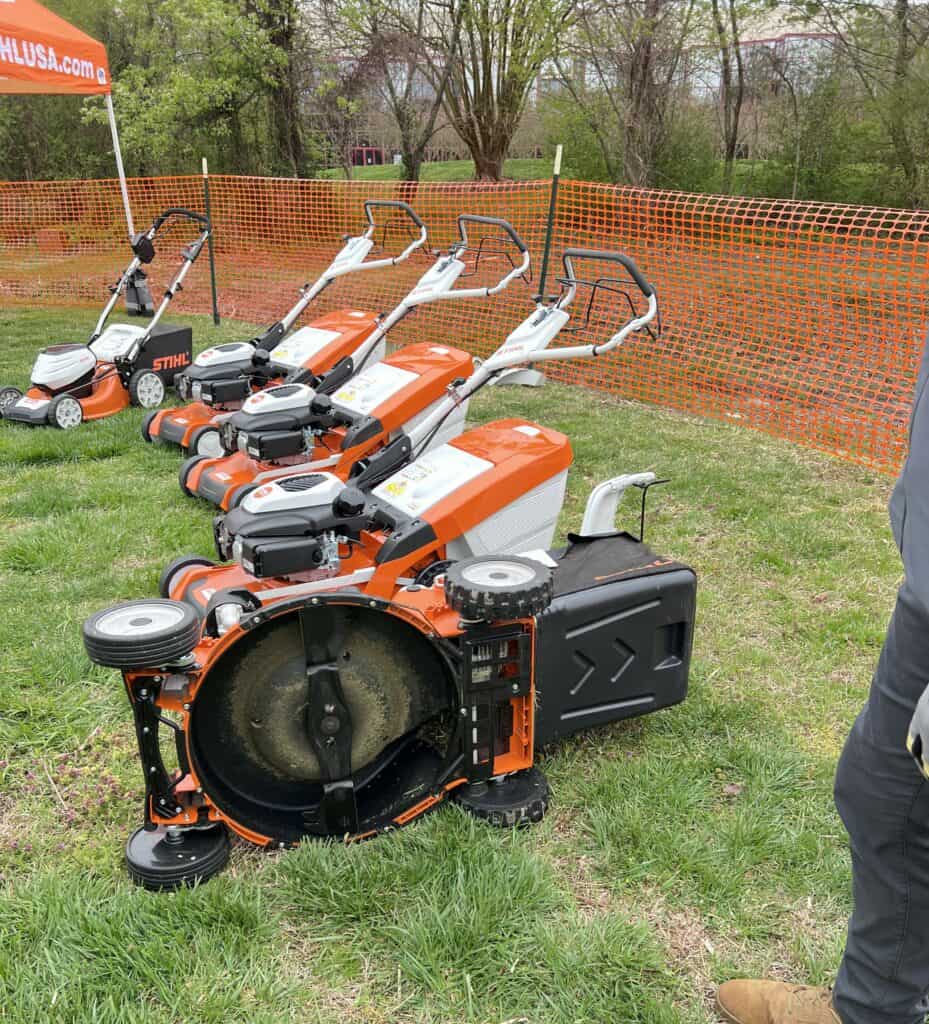
While we did get a good look at the RMA 765 V (below), this was one area of our product demos where gas got the early spotlight.
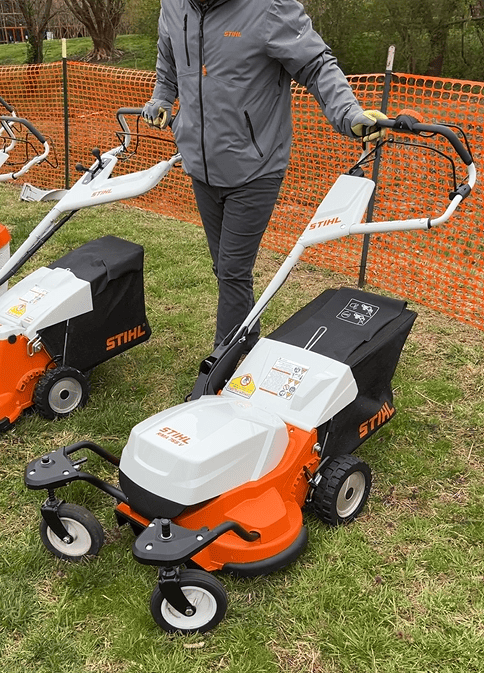
RM Push Mowers
The mono-handle design on the company’s new RM line of push mowers is striking. Product Manager Andrew Johnson is quick to tout its advantages. With only a single “rail” on the mower, you have easy access to the mower’s “bag” and the ability to make easier height adjustments.
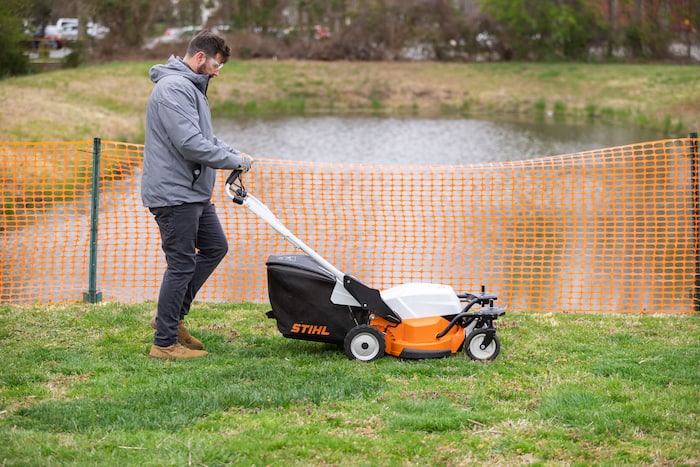
Other notable features on many of the RM line of mowers are their air-assisted clamshell polymer “bag” for efficient collection of clippings. These mowers, too, can effortlessly break down and literally fold in half, storing upright without leaking oil or gas.
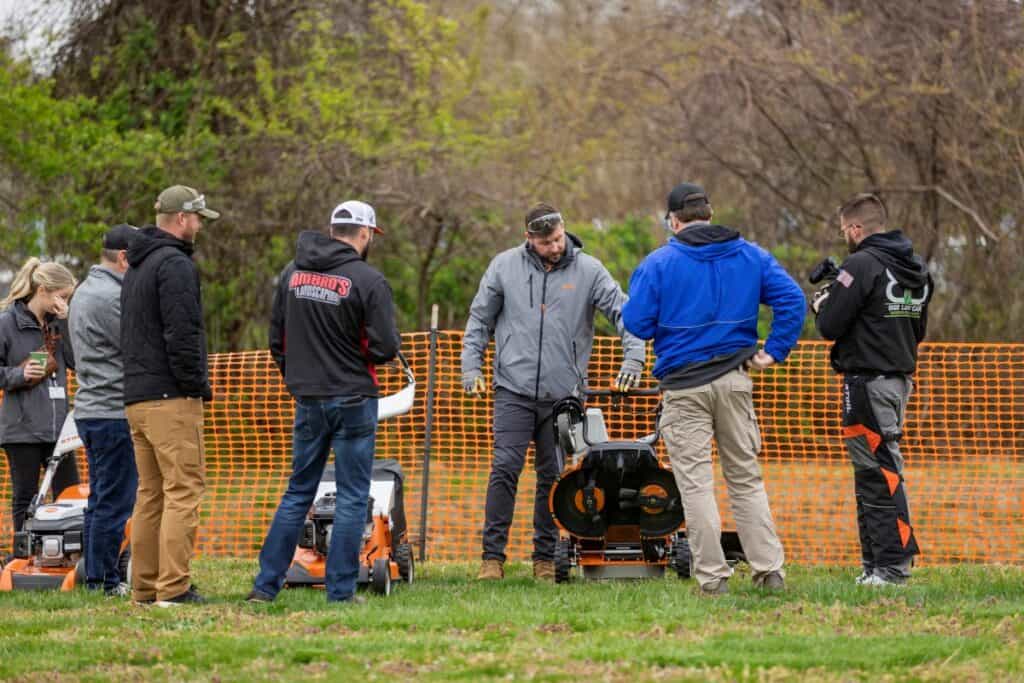
The company claims this design has been used in Europe for several years.
According to Product Segment Manager Louis Danet, a reimaged iMOW robot has also been very well received in Europe. These robots are so new (like some of the other products discussed here) that they don’t even appear yet on the Stihl USA site.
iMOW Robotic Mower
Unlike my iRobot, the iMOW uses perimeter wiring and a centrally installed guide wire (all of which can be buried) to navigate the yard and find its way back to its docking station. What’s beautiful about this new design is that you can start mowing from nearly any point along that guide wire. So it’s feasible to cut the front yard one day and the backyard on another.
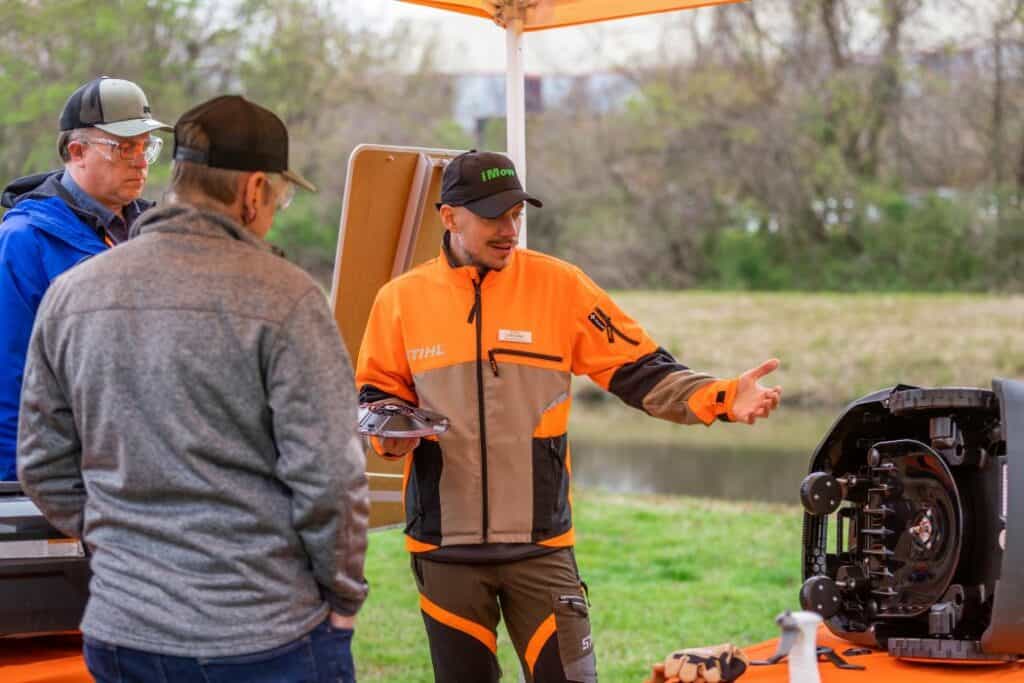
Like your Roomba, it can be controlled from your smartphone or tablet. iMOW’s top-end, the iMOW 7 EVO, is said to be able to cut up to an acre. It has an 11-inch wide cut, can handle up to 4″ in grass height, and has approximately a 4-hour run time. Specs claim it can handle up to a 55 degree slope (with an upgrade kit). It has two sensors that can detect obstacles, including a rain sensor. Another hidden gem here is that it does all its cutting using a set of three specially designed razor blades. Yes, razor blades – that are said to last a mowing season. (In action below.)
In This Video: Lawn Care Pro & Influencer, Blake Albertson
Louie, himself a European import, draws it up brilliantly on paper, but I’d want to see how this thing performs in a real-world setting. How does it do with irregular yard shapes? What about irregular grass types, such as weeds? We all remember the early social vids with the Roomba spreading poo all over the house. For a relatively flat, regular-shaped yard with good grass, the iMOW could be a real-time-saver.
RZA 700 Series Professional Zero-Turn
Just about the time I said to myself, “Well, I am not sure that Europe is dealing with the amount of open grassy land that we have here in the US,” I turned to see Stihl’s latest and greatest Zero-Turn (set in front of 6 total models, mostly gas, we saw that day).
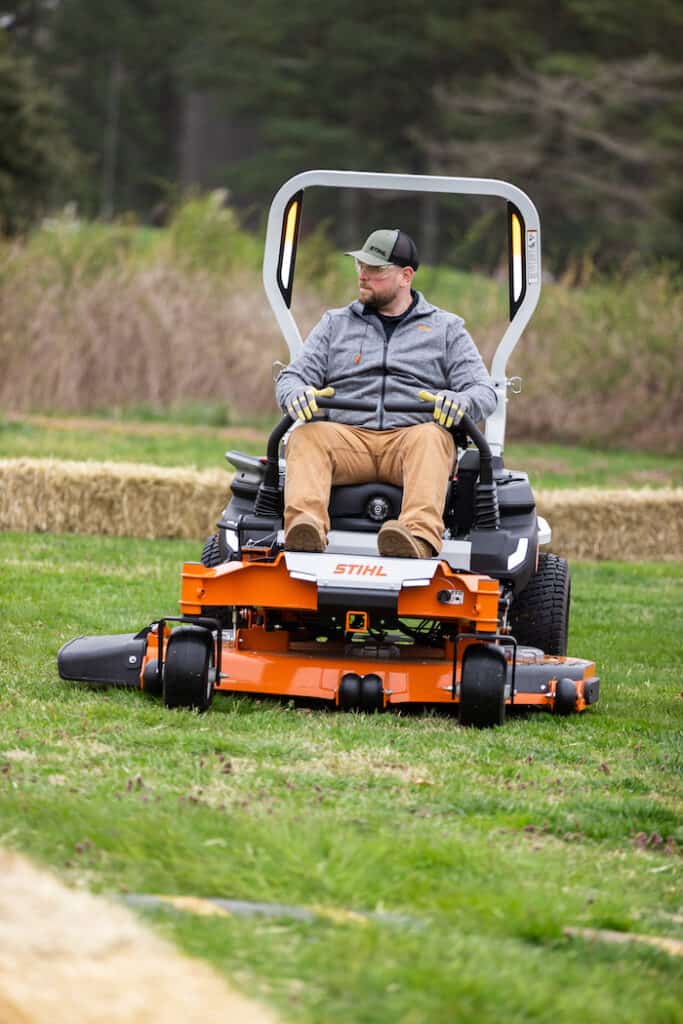
The RZA 700 Series Professional Battery-Powered Zero-Turn. With a sticker price easily equivalent to a KIA, it can be summed up in two words: game and charger. (Here it is in action below.)
In This Video: Reviewer, Jason Cockerham
Stihl has partnered with Kohler to produce the engine for the RM series gas mowers. For their gas-powered Zero-Turns, they pegged Briggs and Stratton.
Making Sense of Stihl Battery Product Lines
Emphasis was clearly on their battery-powered offerings during our product demos.
Stihl offers three lines of batteries – AS, AK, AP.
In a nutshell:
- AS – Precision Gardening – where tools are versatile, compact, and lightweight.
- AK – The Homeowner Line of Batteries – from mowers to blowers, to trimmers and chainsaws.
- AP – Pro Level Performance Batteries – including the AP 200, AP 300 S, and AP 500 S.
- With each step up, you get longer run times and more power.
- The AP line also includes the AR 2000 L and the AR 3000 L Backpack Batteries.
- From what I could see, the AR Battery fits both the BGA 300 Pro Blower and the higher-end walk-behind mower, the RMA 765 V.
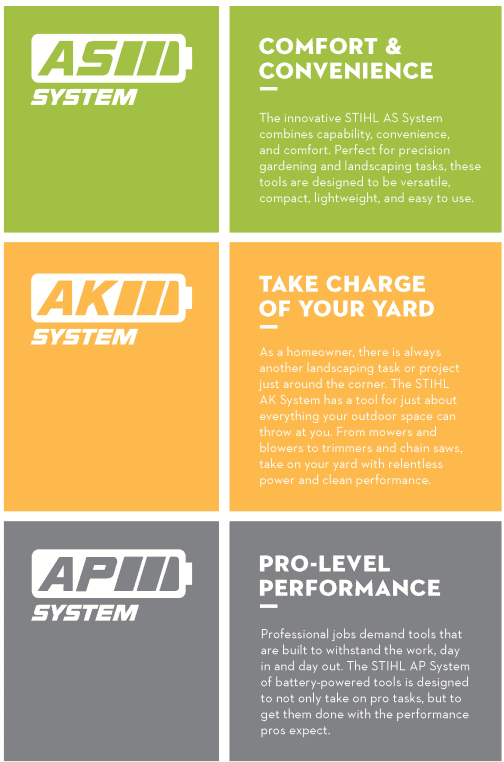
Pro Tip: The ‘A’ in a Stihl model number identifies it as a battery-operated tool. For example, RMs are gas-powered lawnmowers, while RMAs are battery-powered. All Stihl Battery-Operated Outdoor Power Equipment runs on one of these three battery platforms.
Stihl Battery-Operated Outdoor Power Equipment – Product Demos
I’d need more time to cover every excellent tool we saw. Left off my list, I am a firm believer that every homeowner needs a quality battery-operated pole saw. But below is my quick hit on the latest Battery-Operated offerings from Stihl.
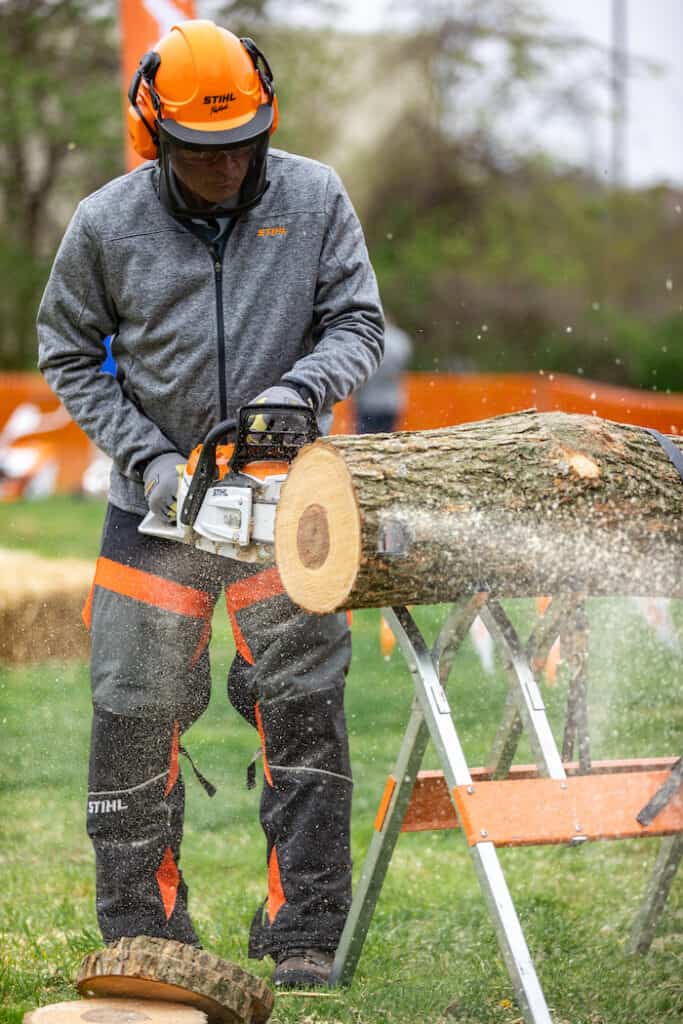
Stihl’s Full Product Catalog can be found on Stihl USA.
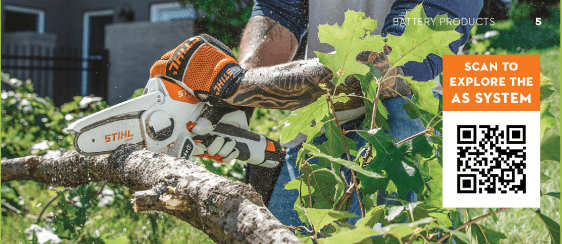
AS Line
GTA 26 Pruner + AS 2 10.8V – Like a mini chainsaw, this is a chain-style pruner with a 4″ guide bar. Also extendable with a pole, the AS 2 battery it ships with allows users up to 80 cuts of 1.6″ diameter wood on one charge.
HSA 30 & HSA 40 Hedge Trimmers—In terms of cordless hedge trimmers that aren’t pulled out more than once or twice a year, this is almost a no-brainer. It’s an outstanding buy at $149.99 with two AS2 batteries. It’s super lightweight, easy to handle, and has what I’ll call exceptional cutting power for the class. The HSA 30 and the HSA 40 are said to have a run time of 80 minutes.
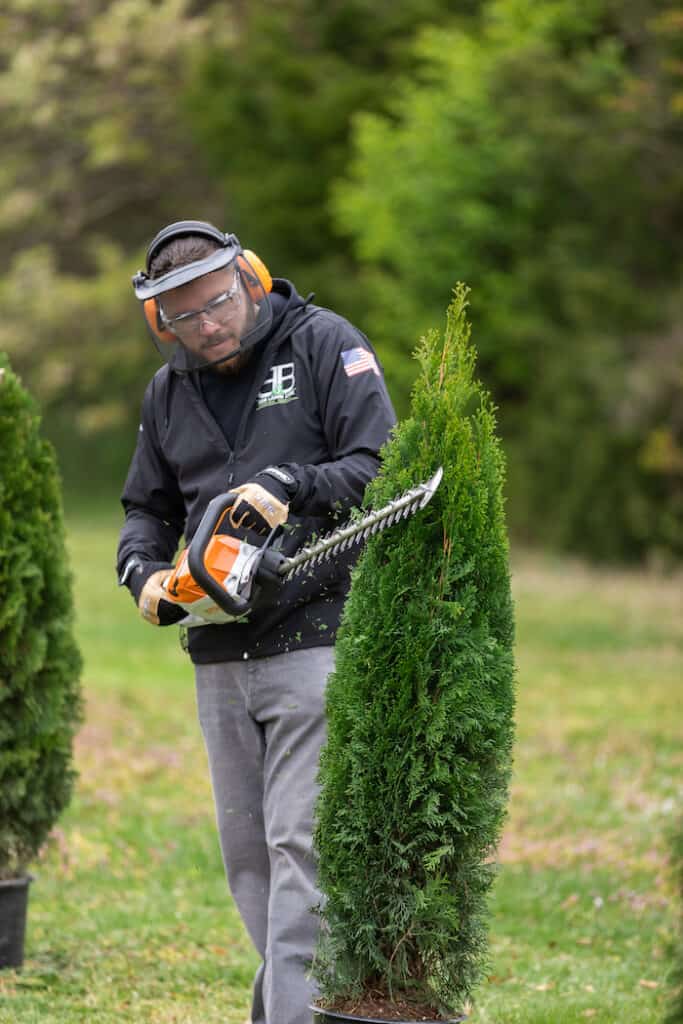
If you need more, check out the AK platform; the HSA 50 and HSA 60 are worth a look.
AK Line
FSA 80 (with Bicycle bars) & FSA 80 R, shipping with an AK20 battery and charger – A little more high-end than the homeowner models. As an owner of a rival brand, sorry, this string trimmer had a better feel. It didn’t take much with the quick-adjust handle to set it up at its most balanced position. Paired with this is the FCA 80 (a dedicated edger).
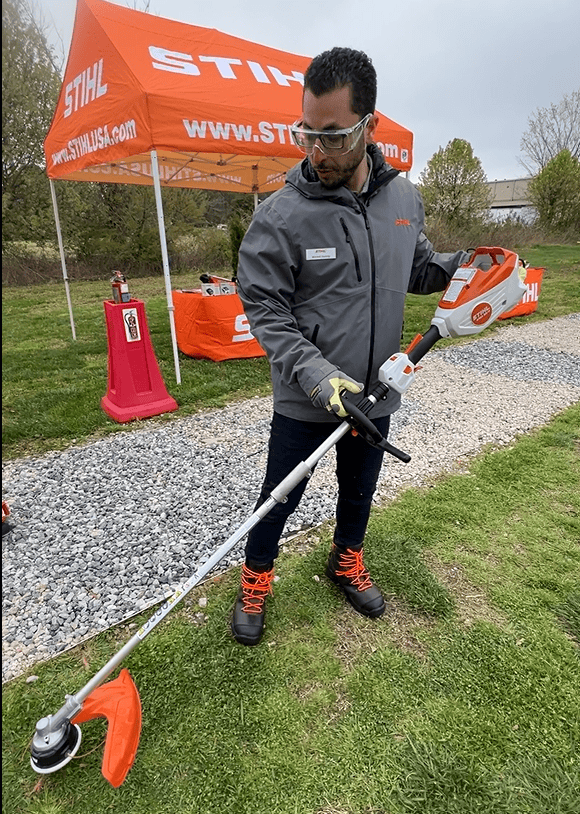
KMA 80 – (pictured above) Designed for homeowners, this is a riff on the more pro KMA 200 RM. This multi-tool features a versatile KombiMotor powerhead, allowing for applications like edging, trimming, cleaning driveways, sideways and decks, cutting branches, trimming hedges, and more. This all-in-one powerhead accepts 14 KombiSystem Attachments and can be fitted with everything from a Pole Pruner to a Trimmer, as well as surprising options – like a Cultivator and even a Power Sweep. (Available KombiSystem Attachments & Run Times listed below.)
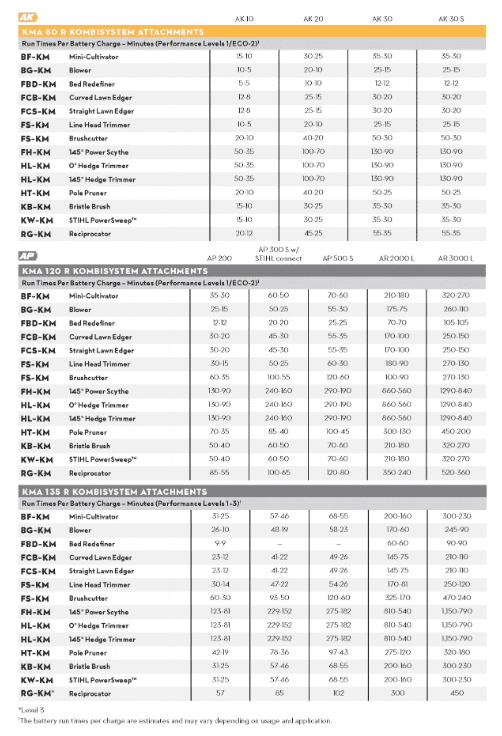
It can ship with an AK 30 Battery, an AL 101 Charger, and its Line Trimmer Attachment, which has an MSRP of $499.99.
I’d love to get this baby out into the field. It is a compelling argument for advanced homeowners. On paper, I love it, but this is one power tool I would need to use for a bit before going confidentially this way or that.
AP Line
FSA 200 & 200 R String Trimmers—These are the Pro version of the FSA 80 discussed above. They advertise longer run times and are touted as the most powerful battery-operated trimmers in the entire Stihl lineup.
BGA 250 Handheld Blower—Stihl’s newest Pro Handheld Blower has a lovely feel, is super balanced, and is said to be as powerful as the BGA 300 Backpack Blower. It was designed with ergonomics in mind, and the shape helps reduce the force of torsion on the wrist. I was able to move a small paver brick across a parking lot with it.
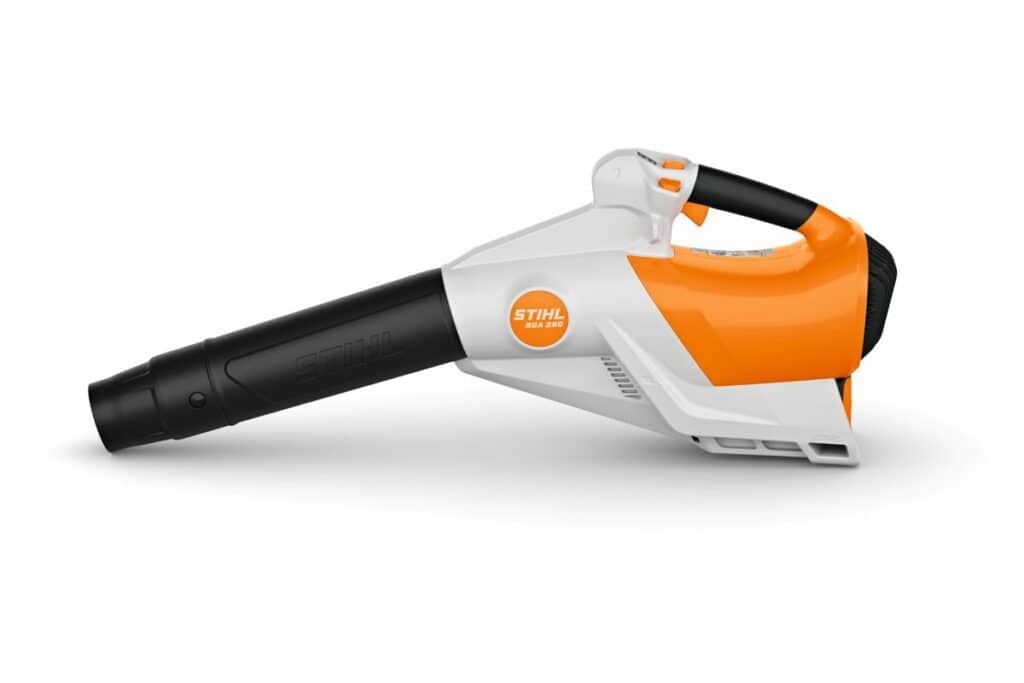
The BGA 300.1 Backpack Blower and the BGA 250 rate a blowing force of 26 Newtons & a high air speed of 190 MPH.
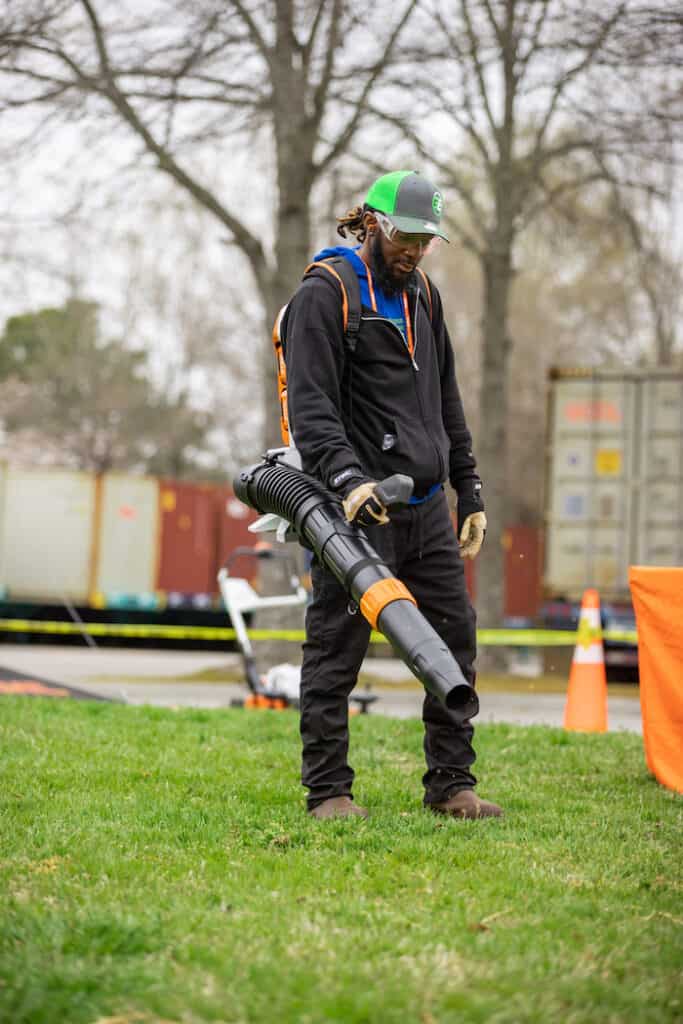
Accessories
CM 12—Charging Management Unit—One of the most incredible things we saw was the first-ever CM 12. This battery management system allows charging up to 30 batteries overnight without overloading a standard 120-circuit. It responds to the state of the batteries to intelligently increase or slow the charge as needed. It speaks to the issue of required infrastructure, which might allow more landscape crews to cut away from gas.
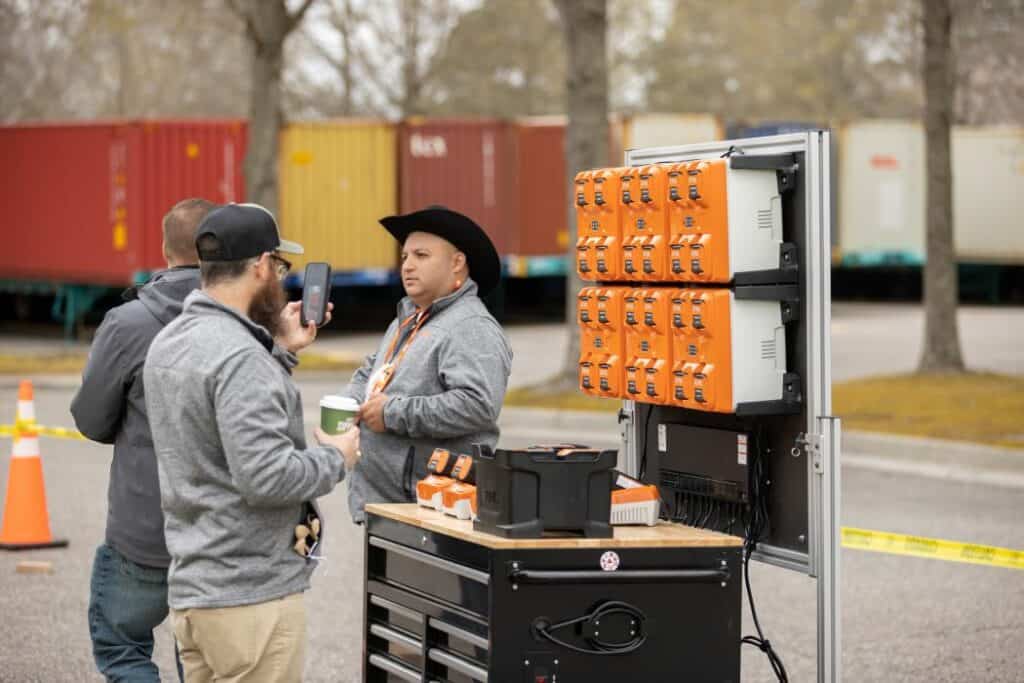
Unfortunately, this doesn’t fit all the cool accessories like the new ADA 1000 Backpack Blower Battery Adapter, the Stihl Smart Connector 2A or the space-aged lightweight and breathable Advanced Arborist Chaps with SuperFabric we wore during our Stihl product demos.
The Landscaper of the Future
VP of Assembly Stuart Morrison is the first one to say he doesn’t think of Stihl as “That Chainsaw Company” (despite what I suggested at the beginning of this article) but rather as “That Outdoor Power Equipment Company.”
This is no more apparent than when you step inside the trailer for what Product Manager Paul Bebowski calls the “Landscape Crew of the Future.” Stihl is already considered to be the leading brand of gas—and Battery-Operated Outdoor Power Equipment for lawn and landscape pros in America.
Stihl is primed to support the complete landscaper / lawn care pros’ move to full battery power.
As you can see in the video above, almost every tool for any application traditionally available in gas is now battery-powered.
Stihl Battery-Powered Chainsaws
It felt scripted when the similar-sized MS 271 Farm Boss wouldn’t cold start on a 40+ degree day under the hand of Product Manager John Allen.
But we quickly learned there was none of that when we went to try out the MSA 300 M C-O. During our demo, I pushed a couple of buttons and was ready. Using this battery-operated chainsaw, I cut 10″ cookies with no problem.
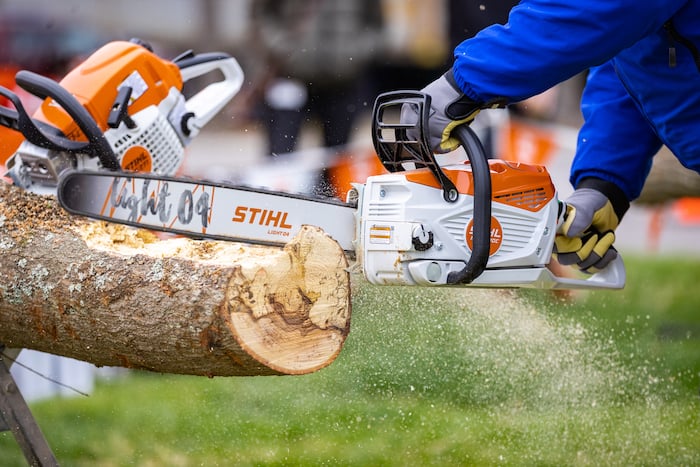
Though I haven’t compared the specs, the 300 M did feel a hair heavier than its gas equivalent—not enough to make a difference, in my opinion.
That said, when talking fuel, we were told you need two AP 500 batteries to match one gas tank on the Farm Boss.
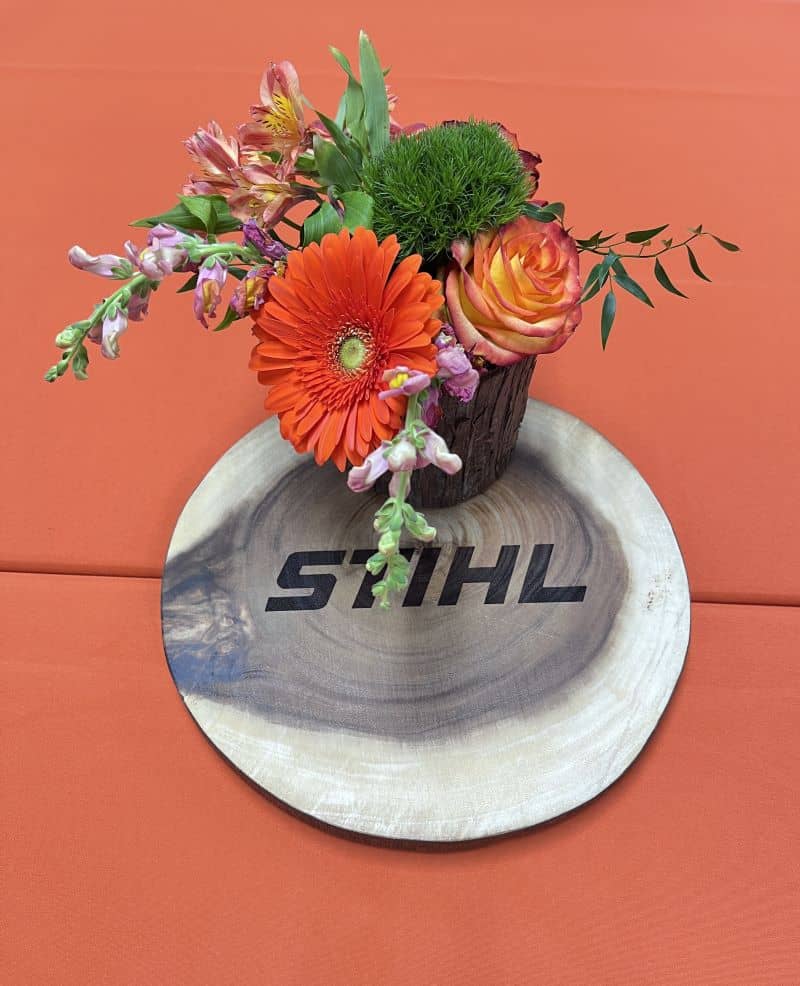
###
This is the time of year when baseball games begin to be played out on TV. They run between commercials for battery-operated outdoor power equipment. Along with many of its competitors, Stihl is right there – getting its message out.
From my visit, I can tell you that Stihl Battery-Operated Outdoor Power Equipment is definitely worth a look. Visit a local Stihl Dealer today.
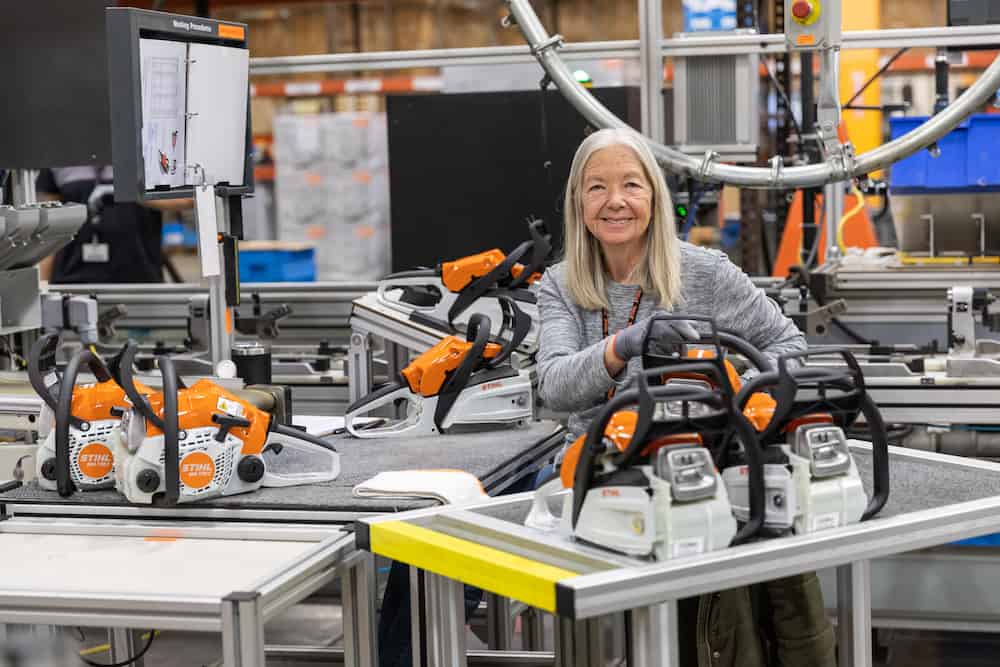
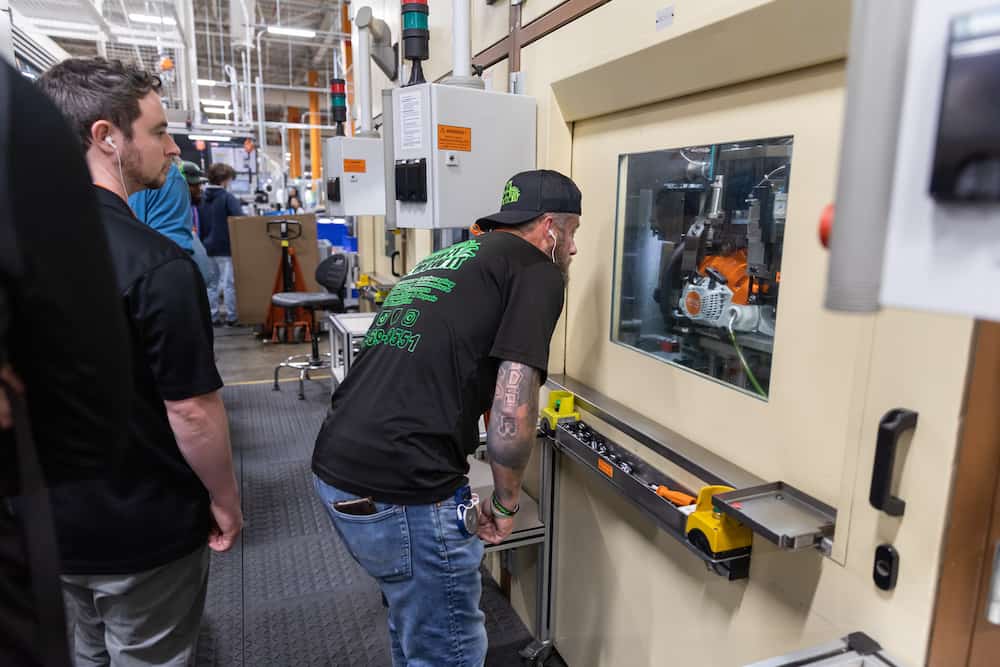
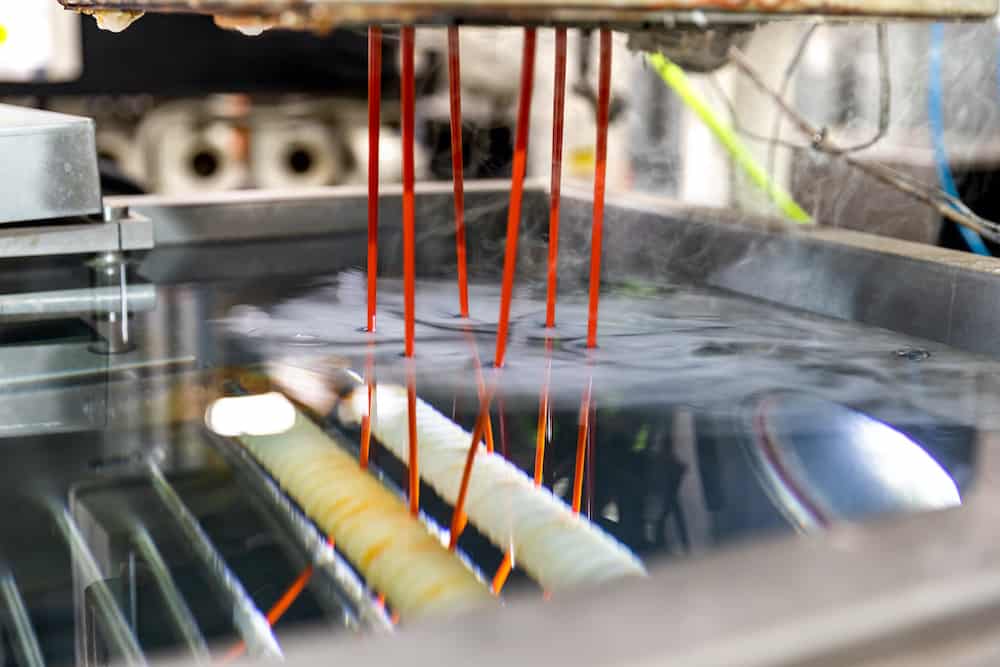
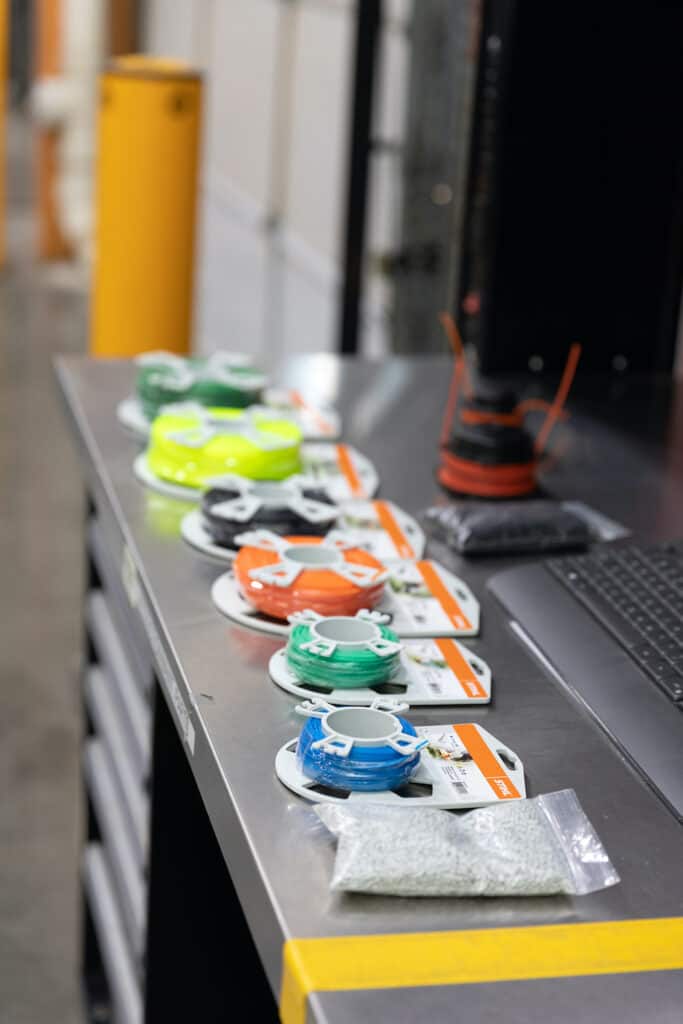
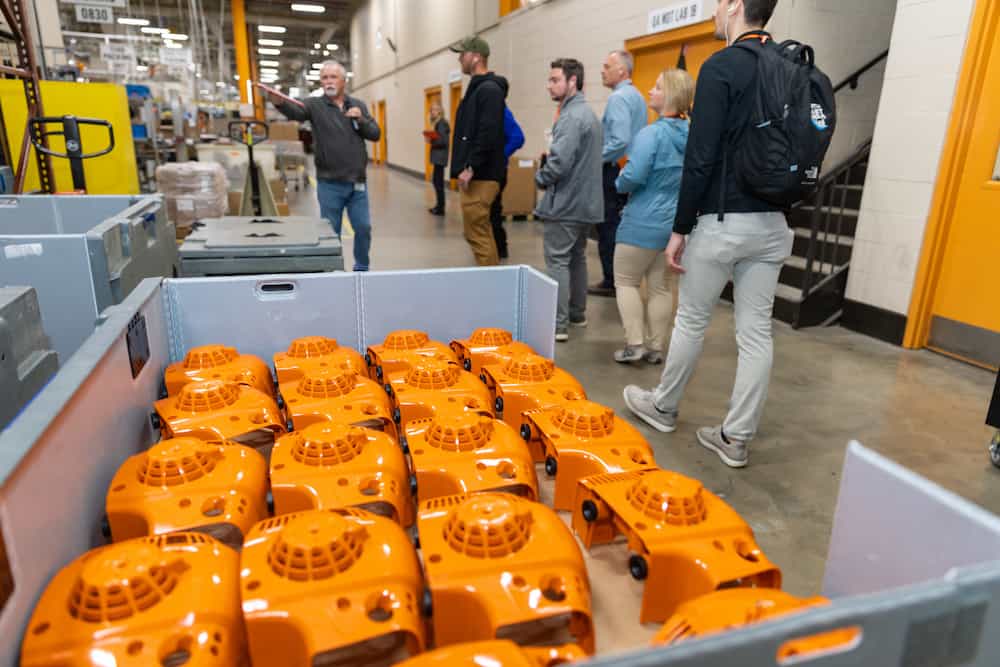
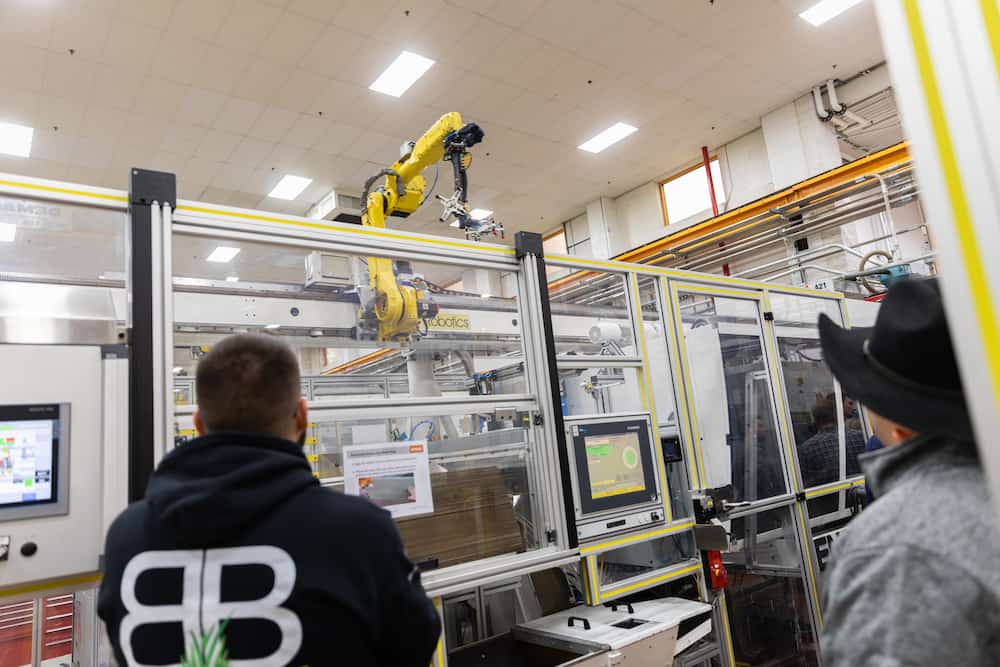
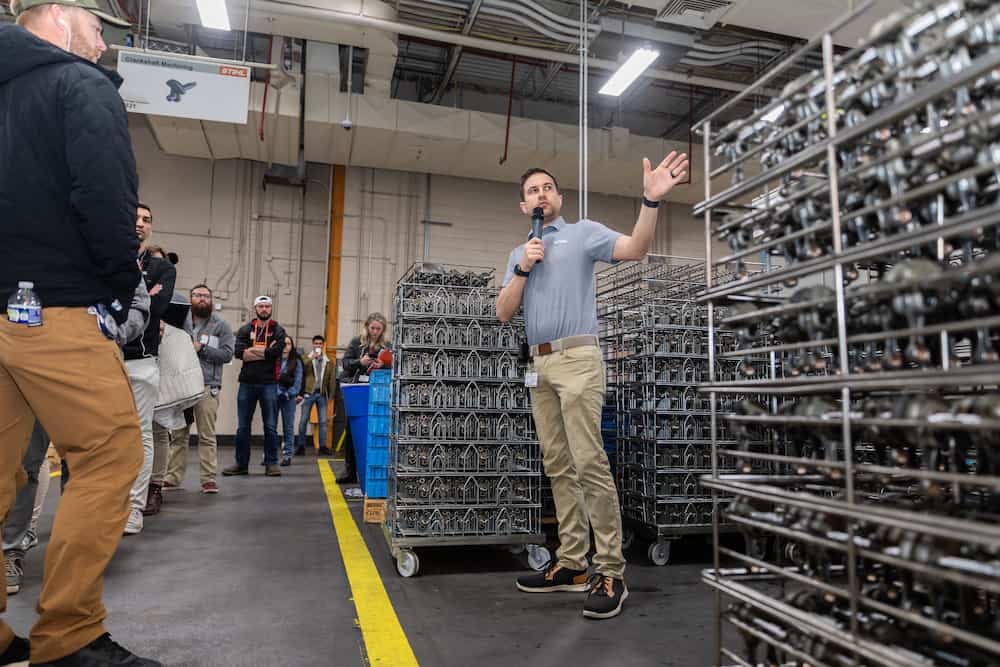
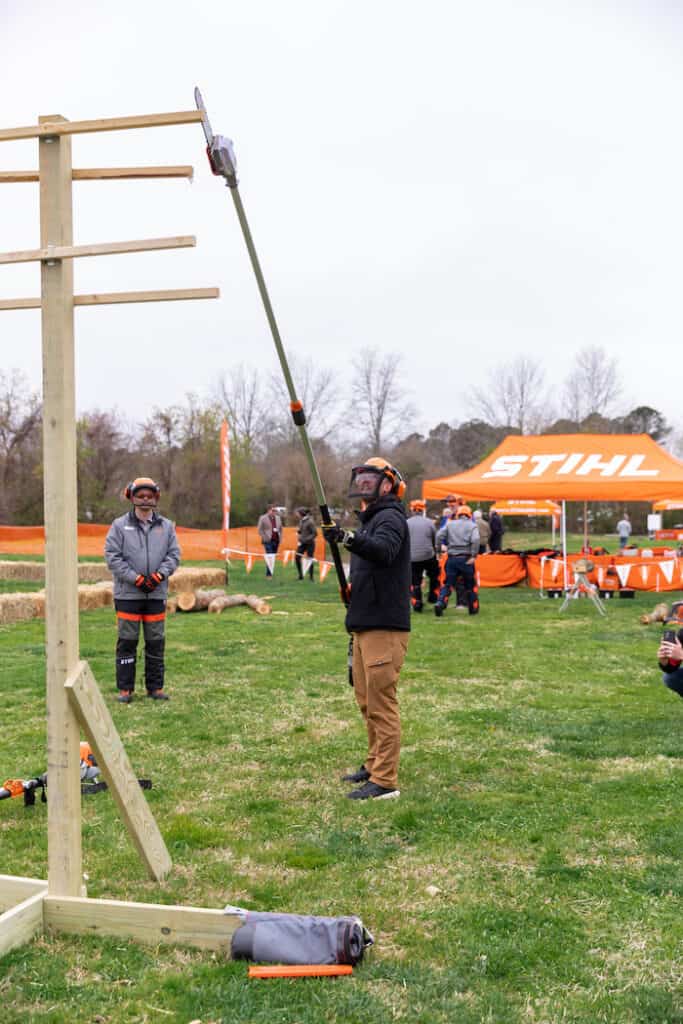
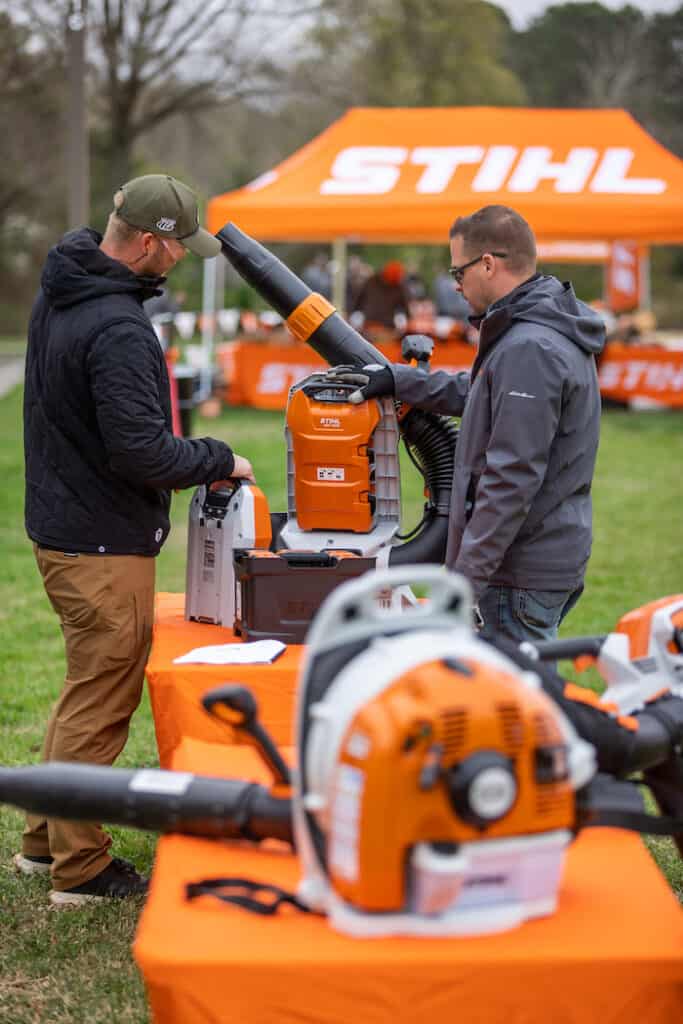
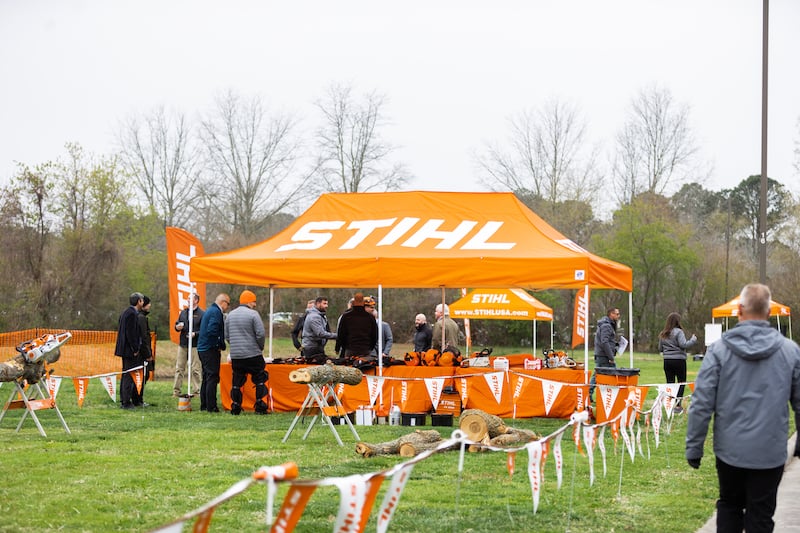
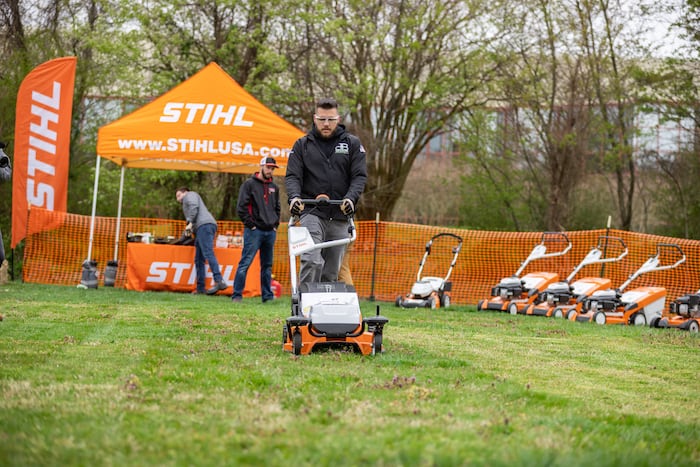
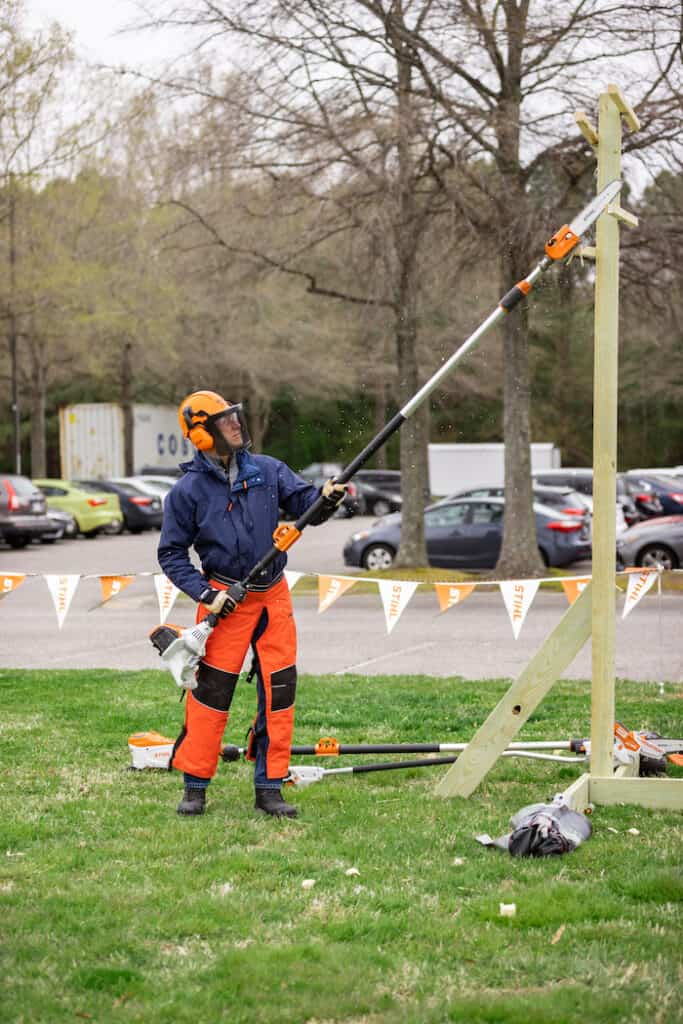
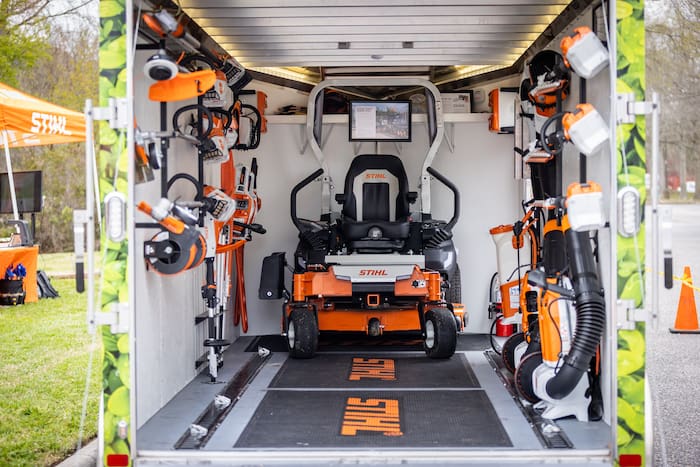
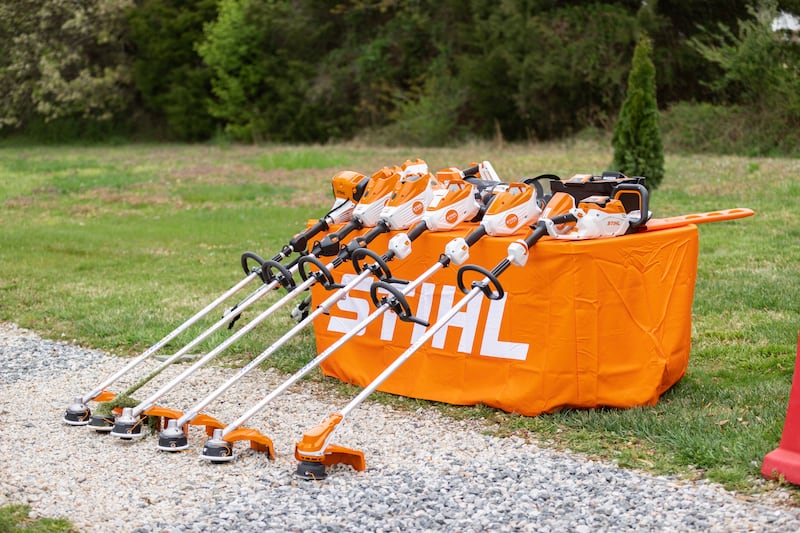
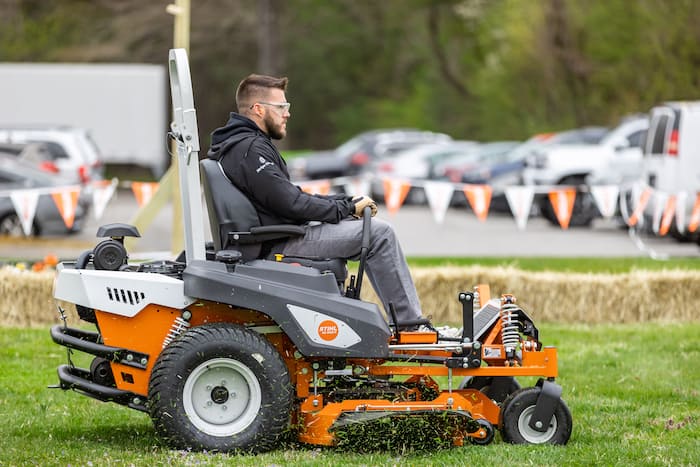
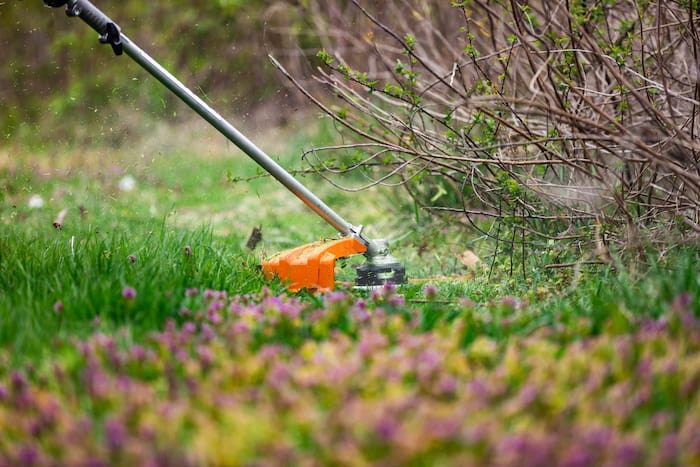
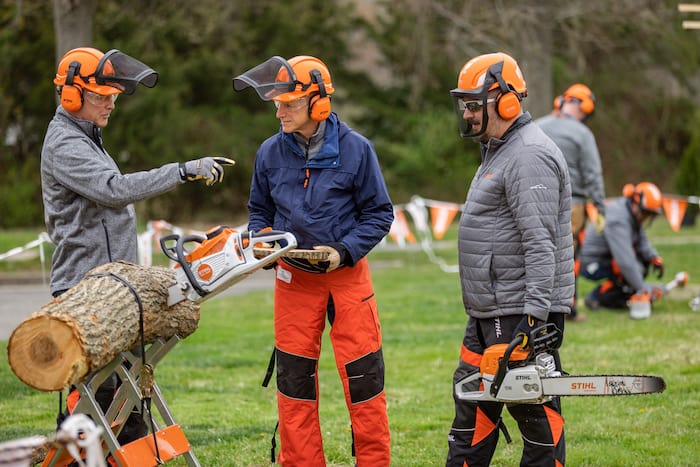
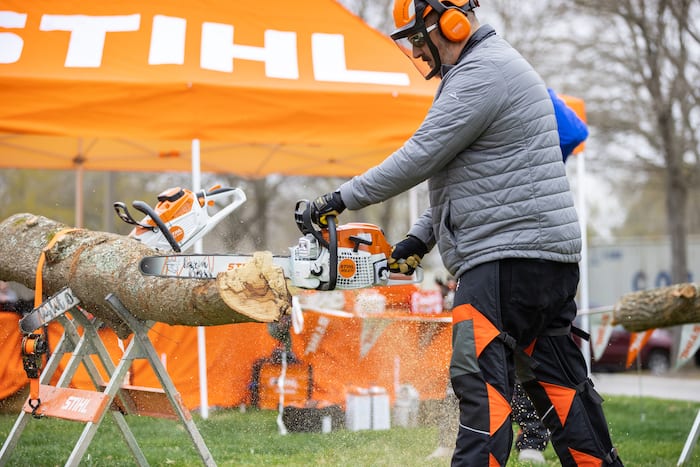
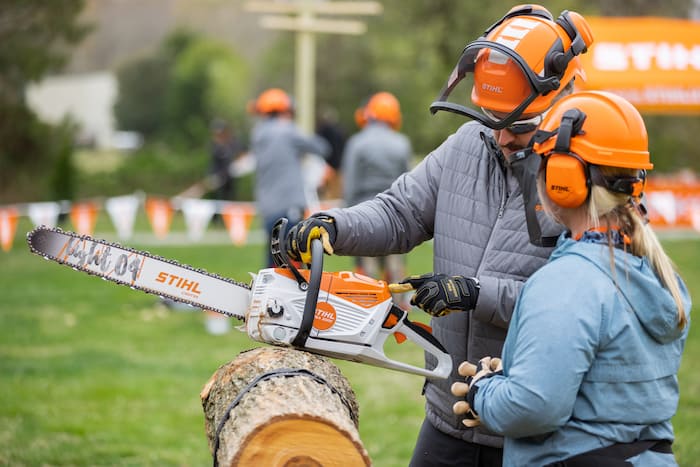
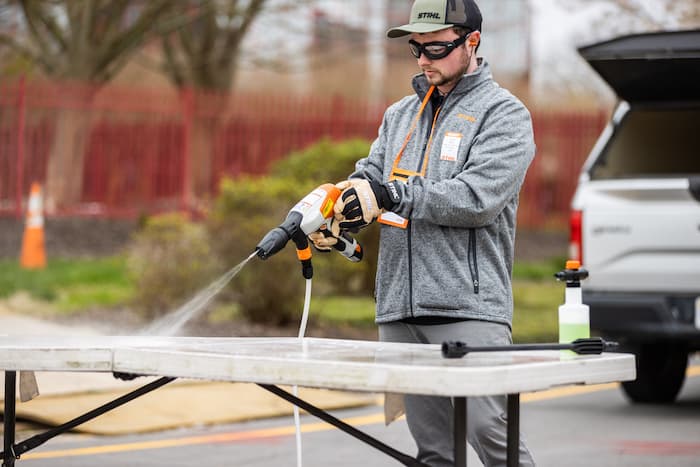
Disclosure: Stihl USA paid for my travel expenses associated with this trip. All views within are my own.

